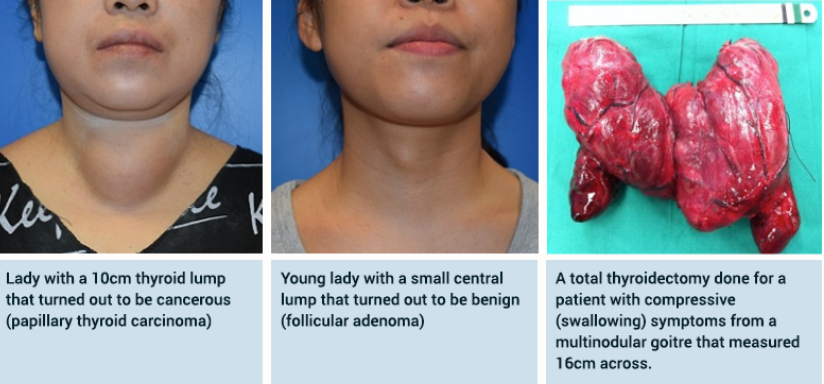Thyroid Problems and Treatments
Nov 05, 2020 19:38
Thyroid diseases can range from mild cases to severe ones like thyroid cancers. The thyroid can be overactive or underactive – resulting in a lot of thyroid disorders. Some cases may require a surgical procedureto treat the thyroid condition. In Singapore, you can consult Dr. Dennis Chua, considered as one of the best ENT specialists in the country with over 15 years of medical experience, for help on thyroid problems and other ENT related concerns. For treatments, it depends on the type of thyroid problem if what kind of doctor is required. Some cases may require medical or surgical intervention from ENT specialists (doctors focused on problems of the ear, nose, and throat, and related head and neck structures).

The thyroid gland can be described as a butterfly or bow tie-shaped gland that is located in the middle of our lower neck (below our voice box or larynx) and along the front of our trachea or windpipe. Our thyroid gland plays an important role in our body – it is one of the endocrine glands that make hormones that influence important bodily processes such as metabolism, and growth and development. When our thyroid is compromised, our overall health can be compromised too.
For the treatment of thyroid problems, doctors will need first to get an idea of what issue they are dealing with and will need to run some tests to determine the best approach for treatment. Running tests is necessary to be able to establish if surgery is required or not. Thyroid tests doctors are performing for diagnosis include Anti-TPO antibodies, thyroid ultrasound (to detect abnormal areas of thyroid tissue), thyroid scan using radioactive iodine to get images of the thyroid, thyroid biopsy to check for cancer, a blood test to check for thyroid-stimulating hormone (TSH) levels to indicate hyperthyroidism or hypothyroidism, check for high-level thyroglobulin – a substance secreted by the thyroid that doctors use as a mark for cancer, and other imaging tests such as CT Scans, MRI Scans or PET scans to help determine the extent of the spread of thyroid problem.
Thyroid problems are common to most middle-aged women but generally can affect adult men and women, and even children. Here are the common conditions encountered in the thyroid gland:
- Hyperthyroidism (overactive gland) – it is a condition where the thyroid glands produce excessive thyroid hormones. This condition can be a result of other thyroid conditions such as Graves disease or an overactive thyroid nodule. Excessive thyroid hormones can accelerate our body’s metabolism causing extreme weight loss or rapid heartbeats.
- Graves’Disease – it is a disease where the immune system attacks the thyroid causing the thyroid to be overstimulated (hyperthyroidism).
- Hypothyroidism (underactive gland) – it is a condition opposite of hyperthyroidism where there is underproduction of thyroid hormonesusually caused by a non-functioning gland or a missing gland. This condition can affect metabolism, mental functions, energy level, and even bowel movements. Symptoms may include fatigue or weakness and constipation. Hypothyroidism can result in mild or severe problems.
- Goiter – it is a term for general swelling. Goiters can be harmless or maybe a symptom of iodine deficiency or thyroid inflammation.
- Thyroiditis – an inflammation of the thyroid, usually from a viral infection and can be painful in some cases.
- Thyroid nodule – an abnormal mass or lump in the thyroid gland and is actually a common condition but few may be cancerous. Thyroid nodules may produce excess thyroid hormones to cause hyperthyroidism. These lumps can grow from small to large lumps of left untreated.
- Thyroid Storm – this is a rare type of hyperthyroidism causing severe illnesses due to extremely excessive thyroid hormones produced.
- Thyroid Cancers –cancer in the thyroid is rare and occurs in thyroid nodules. Thyroid nodules can be cancerous and need a proper diagnosis for treatment. Thyroid cancer is curable in most cases using several treatment approaches.
After diagnosing, treatments option will then be planned out to help the patients depending on the type and severity of their thyroid problem. Treatment options vary from medication to surgery to radiation or chemotherapy. Drugssuch as antithyroid medications can be prescribed to slow down the excess production of thyroid glands in treating hyperthyroidism and thyroid hormone pills to patients to replace the number of unproduced hormones and boost up thyroid hormone levels for hypothyroidism.
Surgical procedure (thyroid surgery) can be performed to treat thyroid cancer, goiter, and also hyperthyroidism. Thyroid surgery may involve the full removal of a thyroid gland to treat the thyroid problem. Some cases will also make use of varying doses of radioactive iodine to destroy an overactive thyroid gland or cancerous tissues in the thyroid. Also, for cancer treatment, multiple sessions using external radiation may be done to kill the cancer cells. Nowadays, they're a lot of available technology to detect and treat thyroid-related problems and illnesses making almost all as curable.

Considering LASIK eye surgery? Understanding the financial aspect is an important step in making an informed decision. While the pricing may seem complex at first glance, it becomes much more manageable when you break it down. Read more
HEALTH TIPS
Jul 14, 2025 17:15

Hair serums have become a staple in modern hair care routines, and for good reason. Whether you're dealing with frizz, dullness, or damage, a good hair serum can completely transform how your hair looks and feels. But what exactly is a hair serum, and how do you use it correctly? Let’s break it down. Read more
HEALTH TIPS
Jul 05, 2025 19:09

Vaginoplasty or vaginal tightening is a safe and effective to increase your intimate health without going for any kind of surgery. Read more
HEALTH TIPS
Jun 24, 2025 19:33
Copyright © Fooyoh.com. All rights reserved. User Agreement | Privacy Policy | Contact us
| Advertising
| About us
| Careers



























































